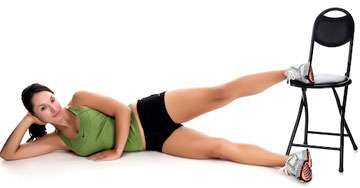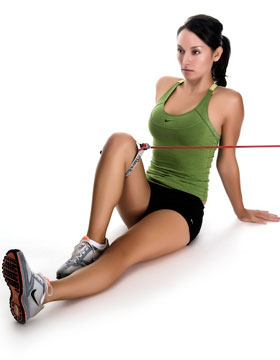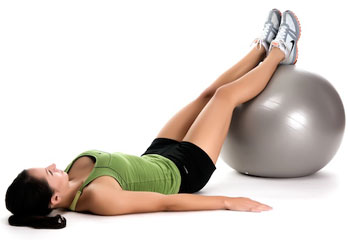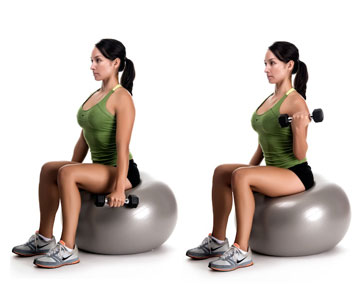-
Board-Certified
Fellowship-Trained
Physical Medicine
& Rehabilitation
![]() Back to Exercise Library.
Back to Exercise Library.
Strengthening Exercises
The best way to prevent injury is by having strong, flexible muscles and joints which resist strain and injury. Stretch slowly, and never do any exercise that causes pain. If you are an athlete, your legs take a lot of abuse. Here are some advanced exercises for those with healthy knees, legs and arms that will get you ready for your sport.
Strength Exercise Menu
- Knee Twist
- Side Leg Raises
- Leg Adduction
- Hip Adduction
- Side Hip Abduction
- Bridge with Ball
- Arm - Triceps Stretch
- Hamstring Stretch
- Bicep Curls with Ball
- Military Press
- Side PullDowns
- Arm - Triceps PullDown
- Squats
- Leg Swings
- Standing Rotation
- Ski Exercise Moguls
- Abdominal Crunch
- Hamstring Stretch II
Knee Twist

Lie on your back with your knees bent. While trying to keep your lower back flat, slowly let both knees fall together toward the floor. Hold for ten seconds, then go back to start position with knees up. Repeat other side. Repeat the exercise 10 times.
Side Leg Raises
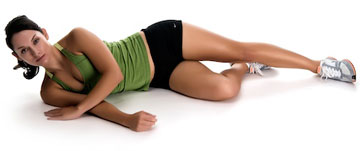
Lie on side as shown with right leg bent and left leg straight. Slowly raise left leg upward. Hold for 5 seconds. Repeat 10 times before switching legs.
Leg Adduction
Lie on your side as shown with your left foot resting on a chair, and the right one below, resting on the ground. Raise the lower leg upward against the bottom of the chair. Hold for 10 seconds and then return the leg to the floor. Repeat 10 times then switch sides to exercise the left leg.
*Roll mouse over image to view full exercise
Hip Adduction
Attach one end of the SportCord to a low stationary fixture, the other to the area three inches above your knee. Slowly extend your right knee outward toward the floor. Hold for ten seconds then return to starting position. Repeat ten times. Switch legs and repeat.
*Roll mouse over image to view full exercise
Side Hip Abduction
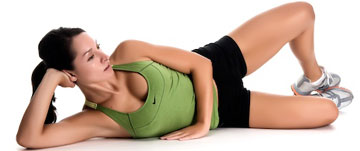
Lie on side with knees and hips bent. Keep feet together. Now spread knees apart lifting upper knee toward ceiling. Do not separate feet. You can place a cuff weight on upper knee to add resistance. Repeat 10 times each side.
Bridge with Ball
Lie on floor with heels on ball. Keeping abs tightened and glutes squeezed, slowly lift your hips off the floor until shoulders, hips and feet in a straight line (don't arch back). Hold position 5 seconds and lower while maintaining ab and glute contraction. Repeat 10 times for each set.
*Roll mouse over image to view full exercise.
Arm - Triceps Stretch
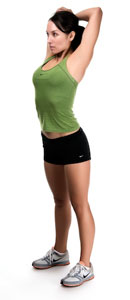
Position hands behind head as shown. Grasp right elbow with left hand and pull toward the left slightly to feel a stretch in the right tricep. Hold for 5 seconds, and then repeat with other arm.
Hamstring Stretch
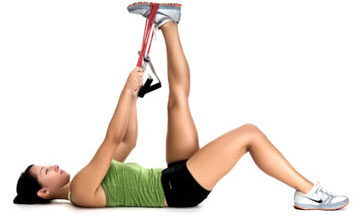
Place a belt or rope around the arch of your foot. Straighten your leg. Slowly begin to pull your leg to a straight up position. Depending upon your flexibility, having your leg point straight up may be a realistic goal. For those who have good flexibility, you may be able to go past vertical during your stretch.
Bicep Curls with Ball
Sit erect on Swiss ball with your chest out, shoulders relaxed and back. Maintain your lumbar curve and keep abdominal muscles tightened. Hold weights in hands and lift alternately bringing hands to shoulder level and down. Remember to relax shoulders and keep shoulder blades down and back. Repeat 10 times with each arm, alternating.
*Roll mouse over image to view full exercise.
Military Press
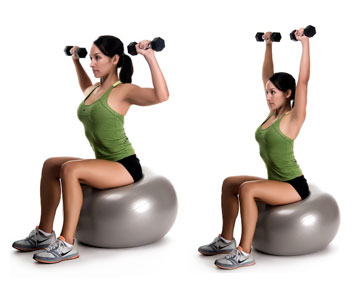
While sitting on a ball or chair, with dumbbells in each hand, position your arms at shoulder level as shown, and then press upward to the ceiling. Repeat 10 times. Try to do 3 sets.
Side Pulldowns
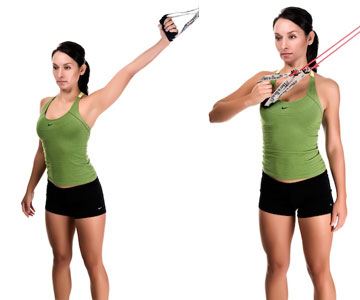
Secure your theraband or Sportcord near the top of the door frame. Start pulling down and across the body (as shown). Be sure to keep the thumb pointed up when at the top of the pattern and rotate it down as your arm descends. Repeat 10 times.
Arm - Triceps Pulldowns
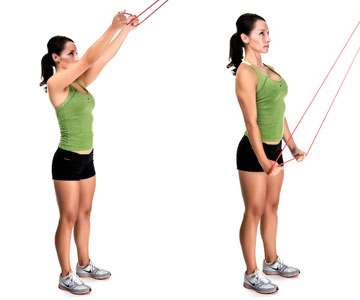
Anchor your theraband or Sportcord at the top of doorframe. Grasp the ends/handles, and pull down toward your hips, keeping your upper arms by the side of your body. Hold for 5 seconds, then relax. Repeat 10 times.
Squats
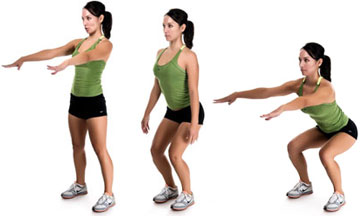
This exercise can strengthen a healthy knee, and prepare it
for the high impact the knees may get on the crusty snow,
or the spring action generated by the fresh powder. To do
this exercise, start with the feet shoulder width apart.
Your hands are outstretched for balance. Lower your body
slowly (do not bounce up and down) until the thighs are horizontal.
Hold your squat position for five seconds, then stand. Repeat
ten times.
Leg Swings
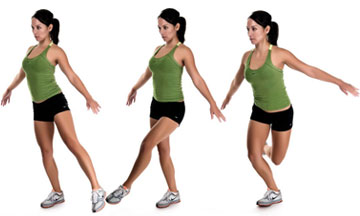
This exercise requires a great deal of balance. You may put
one hand on a chair back to balance if need be. To do this
exercise, stand on your right leg. Extend your left leg
out in front of you until it can almost touch the floor,
18 inches in front. Next, slowly begin to swing the left
leg to the side so the leg may touch the floor, 18 inches
to the side, then back behind you, then back to the starting
position. You left leg will have made a large semicircle
path from front to back. Repeat 10 times, then switch legs.
Standing Rotation
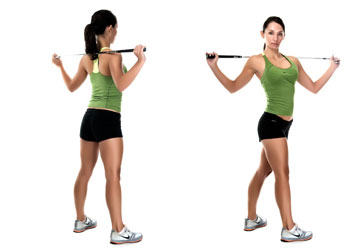
Rotational Stretch - If you want to get back in shape for rotational sports like tennis and golf, you need rotational stretches. Hold a racquet, golf club or broom across your shoulders as shown. Without moving your feet, slowly rotate your shoulders to the left, then back to the right. Also do this stretch for 5 minutes before playing to reduce risk of strain.
Ski Exercise Moguls
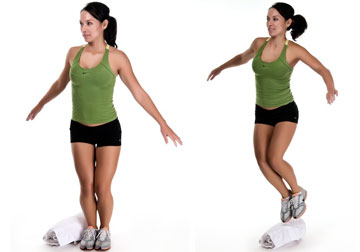
Place a towel on the floor. Start on your right foot with your left hand on the floor, as shown in picture one. Next, jump upward from this position, across the towel landing on your left foot and right hand. Get momentum going and hop from side to side for one minute, then rest. Repeat for 10 one minute intervals.
Abdominal Crunch
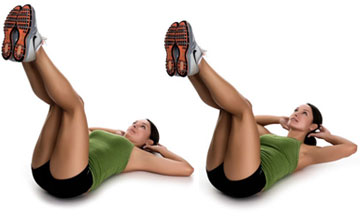
Lie on your back with feet together, raised up (upper left). Raise your shoulders up slightly so they are four inches off the ground (bottom left). Do not use your hands to jerk your head up. Hold for 3 seconds, then lower. Repeat 10 times.
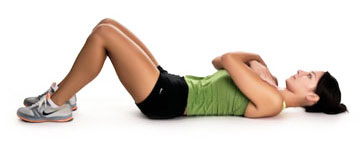
Lie on your back. Try to keep your low back in contact with the ground. Slowly lift your right shoulder up six inches off the ground. Merely raise your shoulders up six inches, hold for one second and lie down. Repeat for ten sit ups, alternating left shoulder and right shoulder. DO not do a full sit up. DO not put your hands behind your neck to jerk yourself upward.
Hamstring Stretch II
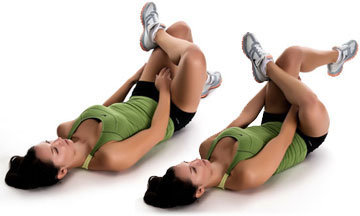
Start with your left leg slightly bent as shown, and with your right leg crossed over the other. Grab the left leg at the back of the thigh and pull toward the chest until the right leg is straight up, but no farther. Hold for 5 seconds, then return to starting position. Switch legs and repeat 10 times.
NOTE: We recognize that people will diagnose and treat themselves. We have provided this medical information to make you more knowledgeable about nonsurgical aspects of care, the role of exercise in your long-term recovery, and injury prevention. In some cases exercise may be inappropriate. Remember, if you diagnose or treat yourself, you assume the responsibility for your actions. You should never do any exercise that causes increased pain. You should never do any exercise that places body weight on a weakened or injured limb or back.
Physician Biographies
-
 Karl Boellert, MD
Karl Boellert, MD -
 Mathew Gowans, MD
Mathew Gowans, MD- Board-Certified
Physical Medicine
& Rehabilitation
- Board-Certified
-
 Michael P.B. Kilburn, MD
Michael P.B. Kilburn, MD-
Board-Certified
Fellowship-Trained
Spinal Neurosurgeon
-
Board-Certified
-
 Sumeer Lal, MD
Sumeer Lal, MD-
Board-Certified
Fellowship-Trained
Spinal Neurosurgeon
-
Board-Certified
-
 John Cole, MD
John Cole, MD-
Board-Certified
Fellowship-Trained
Spinal Neurosurgeon
-
Board-Certified
Back to Life Journal

Home Remedy Book

![]() Website Design & Educational Content © Copyright 2023 Prizm Development, Inc.
Developing Centers of Excellence for Better Healthcare.
Website Design & Educational Content © Copyright 2023 Prizm Development, Inc.
Developing Centers of Excellence for Better Healthcare.
Prizm is the most experienced developer of spine and orthopedic centers in the U.S. with content-rich educational web sites for physicians.

